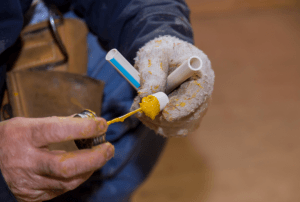Dealing with plumbing means often dealing with adhesives and glues that are used to seal and connect pipes. While these substances are incredibly beneficial for ensuring a watertight bond, they can be a nuisance when they end up where they aren’t supposed to be. Whether it’s accidental spillage, a need to undo a connection, or just glue on your hands, knowing how to tackle these sticky situations is crucial. In this guide, we’ll delve into effective techniques and methods on how to deal with common plumbing adhesive issues.

Strategies to Dissolve Plumbing Glue
Over time or due to errors during installation, there might arise a need to dissolve or loosen plumbing adhesive. Whether it’s to reposition a joint or rectify a mistake, understanding how to approach this can be a lifesaver.
Effective Solvents for Stubborn Glues
The primary way to dissolve plumbing glue or cement is by using solvents. Acetone, commonly found in nail polish removers, can be quite effective. Always wear gloves and work in a well-ventilated space when handling solvents. Additionally, ensure that the solvent won’t damage the pipe material. Some plastics might get softened or become brittle when exposed to certain solvents.
Heating: A Gentle Loosening Method
Sometimes, the application of mild heat can help in softening and loosening plumbing glue. This method can be particularly useful for pipes that cannot be exposed to solvents. Using a hairdryer or heat gun, direct warm air onto the glued joint, moving in a consistent motion to avoid overheating one spot. As the adhesive softens, gently twist or move the connection to separate the parts.
How to Eliminate Plumbing Glue Residues
Every plumber or DIY enthusiast has been there – a spot of plumbing adhesive or cement that’s dried up on a surface or on their hands. While these adhesives are designed to be long-lasting and water-resistant, there are ways to remove them effectively.
Getting Rid of Glue on Hands
For those wondering how to get plumbing glue off hands or how to remove plumbing adhesive after an unintended spill, reaching for a natural oil might be the solution. Olive oil or vegetable oil can effectively break down many adhesives. Apply the oil generously onto the affected area, gently massaging it. After a few minutes, use a cloth or scrubbing pad to wipe away the softened glue. If remnants remain, a combination of baking soda and water can act as a mild abrasive to scrub away the last bits.
Clearing Off Unpleasant Glue Smells
While adhesives and glues serve a critical function in plumbing, the associated smell can be quite off-putting. To get rid of the plumbing glue smell, ensure proper ventilation in the workspace. Opening windows, using fans, or even employing activated charcoal bags can help absorb and disperse the strong odors.
Tips for Managing Plumbing Primers and Adhesives
Knowing how to manage and maintain your plumbing adhesives ensures that they are always ready for use and prevents potential mishaps.
Safe Storage is Key
Always store plumbing glues, cements, and primers in a cool, dry place away from direct sunlight. Proper storage not only ensures the efficacy of the product but also reduces risks associated with leaks or spills.
Quick Remedies for Opening Sealed Primers
If you’re facing challenges on how to open plumbing primer containers that have been sealed shut due to dried glue or cement, try wrapping a cloth soaked in hot water around the lid. This often softens the adhesive enough to allow for the container to be opened.
Frequently Asked Questions
Can common household items be used to remove plumbing glue?
Yes, household staples like vinegar and rubbing alcohol can often help in dissolving or loosening some adhesives.
Is it safe to use plumbing glue indoors without ventilation?
No, it’s always recommended to use in well-ventilated areas to prevent inhaling potentially harmful fumes and ensure quick drying.
Can old or expired plumbing glue still be effective?
While it might work, it’s best to use fresh adhesive for optimal bonding and lasting results.
Are there eco-friendly alternatives to traditional plumbing glues?
Yes, several brands offer adhesives labeled as eco-friendly or with reduced VOC content, ensuring minimal environmental impact.
Ensuring Seamless Plumbing Projects with R.S. Andrews
The nuances of handling plumbing adhesives may seem daunting, but with the right knowledge and techniques, they can be tackled with ease. Whether you’re a seasoned plumber or a homeowner trying their hand at DIY plumbing projects, understanding how to manage, apply, and remove plumbing glues is invaluable. At R.S. Andrews, we pride ourselves on offering expert plumbing services and guidance. Don’t hesitate to reach out for professional assistance and insights into all things plumbing.

